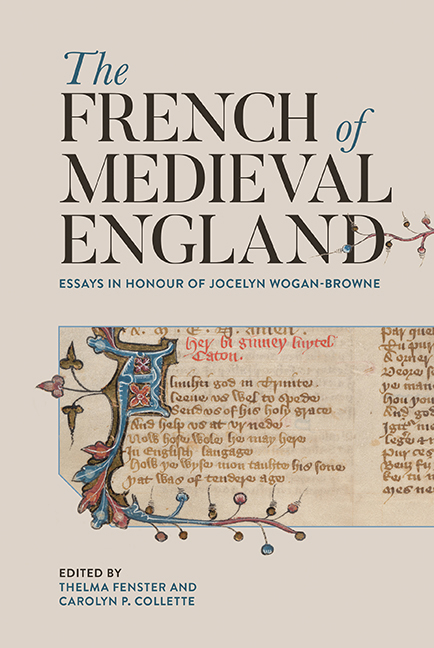Book contents
- Frontmatter
- Contents
- List of Illustrations
- List of Contributors
- List of Abbreviations
- Foreword: ‘The Light I Never Left Behind’: Jocelyn Wogan-Browne
- Introduction: Recognizing the French of Medieval England
- 1 The Gloss to Philippe de Thaon's Comput and the French of England's Beginnings
- 2 The Scandals of Medieval Translation: Thinking Difference in Francophone Texts and Manuscripts
- 3 Contrafacture and Translation: The Prisoner's Lament
- 4 Complaining about the King in French in Thomas Wright's Political Songs of England
- 5 The Chanson d’Aspremont in Bodmer 11 and Plantagenet Propaganda
- 6 The Use of Anglo-Norman in Day-to-Day Communication during the Anglo-Scottish Wars (1295–1314)
- 7 Middle English Borrowing from French: Nouns and Verbs of Interpersonal Cognition in the Early South English Legendary
- 8 William Langland Reads Robert Grosseteste
- 9 Disability Networks in the Campsey Manuscript
- 10 English Women and Their French Books: Teaching about the Jews in Medieval England
- 11 French Residents in England at the Start of the Hundred Years War: Learning English, Speaking English and Becoming English in 1346
- 12 French Immigrants and the French Language in Late-Medieval England
- 13 Fashioning a Useable Linguistic Past: The French of Medieval England and the Invention of a National Vernacular in Early Modern France
- 14 Admiring Ambivalence: on Paul Meyer's Anglo-Norman Scholarship
- 15 Twenty-First Century Gower: The Theology of Marriage in John Gower's Traitié and the Turn toward French
- 16 Royaumes sans frontières: The Place of England in the Long Twelfth Century
- Afterword
- Bibliography
- Index
- Publications of Jocelyn Wogan-Browne
- Tabula Gratulatoria
6 - The Use of Anglo-Norman in Day-to-Day Communication during the Anglo-Scottish Wars (1295–1314)
Published online by Cambridge University Press: 12 August 2020
- Frontmatter
- Contents
- List of Illustrations
- List of Contributors
- List of Abbreviations
- Foreword: ‘The Light I Never Left Behind’: Jocelyn Wogan-Browne
- Introduction: Recognizing the French of Medieval England
- 1 The Gloss to Philippe de Thaon's Comput and the French of England's Beginnings
- 2 The Scandals of Medieval Translation: Thinking Difference in Francophone Texts and Manuscripts
- 3 Contrafacture and Translation: The Prisoner's Lament
- 4 Complaining about the King in French in Thomas Wright's Political Songs of England
- 5 The Chanson d’Aspremont in Bodmer 11 and Plantagenet Propaganda
- 6 The Use of Anglo-Norman in Day-to-Day Communication during the Anglo-Scottish Wars (1295–1314)
- 7 Middle English Borrowing from French: Nouns and Verbs of Interpersonal Cognition in the Early South English Legendary
- 8 William Langland Reads Robert Grosseteste
- 9 Disability Networks in the Campsey Manuscript
- 10 English Women and Their French Books: Teaching about the Jews in Medieval England
- 11 French Residents in England at the Start of the Hundred Years War: Learning English, Speaking English and Becoming English in 1346
- 12 French Immigrants and the French Language in Late-Medieval England
- 13 Fashioning a Useable Linguistic Past: The French of Medieval England and the Invention of a National Vernacular in Early Modern France
- 14 Admiring Ambivalence: on Paul Meyer's Anglo-Norman Scholarship
- 15 Twenty-First Century Gower: The Theology of Marriage in John Gower's Traitié and the Turn toward French
- 16 Royaumes sans frontières: The Place of England in the Long Twelfth Century
- Afterword
- Bibliography
- Index
- Publications of Jocelyn Wogan-Browne
- Tabula Gratulatoria
Summary
Jocelyn Wogan-Browne's outstanding contributions to research into the Middle Ages have highlighted the importance of women and female religious institutions in sponsoring and furthering Anglo-Norman literature, geographically as well as intellectually. Many members of abbeys and priories came from aristocratic families where Anglo-Norman was cultivated as a second language, and the scattering of religious houses widely throughout the country coincidentally aided the geographical spread of the language. In this tribute to our friend and colleague I would like to show how noble and administrative circles also contributed to the diffusion of French in the north of England, and more specifically in Scotland, far from the royal centers of French usage in London and surrounding areas. The documents collected under the title Chancery Miscellanea Scotland, most of them in connection with the events of the Scottish–English wars between 1296 and 1315, constitute a precious resource for illustrating the deep-rootedness of Anglo- Norman among the Scottish nobility, who, from the perspective of language use, turn out to have been indistinguishable from their English counterparts, leading us to recognize the very significant extension of Anglo-Norman.
I will begin with a brief introduction to the troubled history of those times, known as the Scottish War of Independence. Conflict was triggered by the death of King Alexander III of Scotland in 1286, followed by that of the king's threeyear- old granddaughter and only heiress, Princess Margaret of Norway, who died on her way back to Scotland. Her death marked the beginning of a struggle between three representatives of the leading Scottish noble families who laid claim to the throne, namely, John Balliol, John Comyn and Robert de Bruce. Balliol eventually took control of the situation and was crowned king of Scotland in 1292. Edward I had been following Scottish affairs very closely, trying to influence their evolution in his favor, since, as king of England, he claimed a right of suzerainty over Scotland. In this context, Balliol's overly conciliatory policy toward the English became the cause of growing discontent among the Scots, and in 1295 the discontented Scottish barons created a tutorship council whose members were designated as guardians of Scotland. All the while, Scotland and France were tightening their alliance, which was reason enough for England to engage in war with Scotland in the spring of 1296.
- Type
- Chapter
- Information
- The French of Medieval EnglandEssays in Honour of Jocelyn Wogan-Browne, pp. 116 - 127Publisher: Boydell & BrewerPrint publication year: 2017



